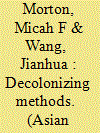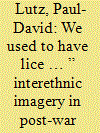|
|
|
Sort Order |
|
|
|
Items / Page
|
|
|
|
|
|
|
| Srl | Item |
| 1 |
ID:
145855


|
|
|
|
|
| Summary/Abstract |
The concept of indigeneity is highly problematic in Asia, where a heightened degree of spatial mobility and ethnic fluidity challenge conventional understandings of Indigenous peoples (IPs) as rooted, stable, and unchanging from time immemorial. As some scholars have argued, however, this conception of indigeneity ignores the fact that many IPs have had multiple experiences of displacement due to their colonization by outsiders. Here, the authors discuss one such group – the Akha minority residing throughout the Upper Mekong Region – that in spite of multiple historical experiences of displacement, marginalization, and, more recently, colonization has maintained an intimate connection with their ancestral homeland. Akha have maintained this connection by way of their ‘intimate place-making cosmographies’, whereby non-Akha space is reconfigured as a microcosmic totality of the larger Akha cosmos. These practices have allowed for Akha to sustain and vitalize their distinct identity as Akha in the face of various external pressures from non-Akha others.
|
|
|
|
|
|
|
|
|
|
|
|
|
|
|
|
| 2 |
ID:
185930


|
|
|
|
|
| Summary/Abstract |
This paper discusses interethnic dynamics in a multi-ethnic Khmu and Akha village in the uplands of Phongsali Province, far-north Laos. It offers an intimate vignette on how local Khmu people’s patronizing disposition towards their Akha neighbors – and Sino-Tibetan highlanders more broadly – has been shaped by Laos’ recent history of war, revolution, and development. In particular, it shows how essentializing images of Akha as backward bumpkins in need of civilizing tutelage have provided local Khmu with a foil and platform for their pursuit of a culturally specific sense of modernity. In so doing, this paper refocuses the analysis of interethnic relations in Laos away from state-centered, lowland-upland, majority-minority frameworks, and towards localized, micro-regional and, most significantly, intra-upland dynamics. Concomitant to this refocus, this paper offers novel insights into the localized impact of Laos’ watershed civil war and its lingering aftermath. It also speaks to broader issues, including the applicability of the scholarly trope of “internal Orientalism” across scales, as well as the ethics and politics of researching inter-ethnic relations in a society still marked by the trauma of war.
|
|
|
|
|
|
|
|
|
|
|
|
|
|
|
|
|
|
|
|
|